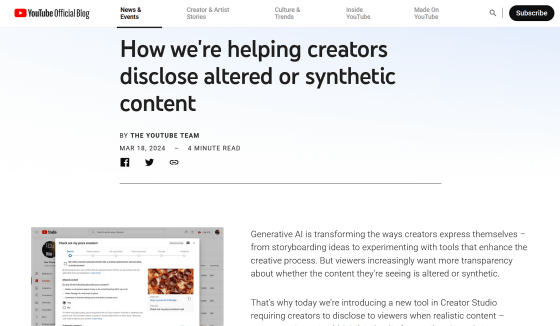YouTube rolls out tools to label 'realistic AI-generated content' and requires video creators to disclose use of generated AI

Nowadays, the development of generation AI has made it possible to generate content that looks like the real thing, and it is now possible for ordinary internet users to discern whether the image or video they are viewing is real or whether it is content generated by AI. It's becoming more difficult. Therefore, on March 18, 2024 local time, YouTube rolled out a tool that allows video creators to label realistic content created with generative AI.
How we're helping creators disclose altered or synthetic content - YouTube Blog

Hey YouTube creators, it's time to start labeling AI-generated content in your videos | CNN Business
https://edition.cnn.com/2024/03/18/tech/youtube-ai-label-for-creators/
YouTube adds new AI-generated content labeling tool - The Verge
https://www.theverge.com/2024/3/18/24104743/youtube-ai-generated-content-disclosure-label
YouTube says it will require creators to label some AI content
https://www.nbcnews.com/tech/tech-news/youtube-says-will-require-creators-label-ai-content-rcna143937
Generative AI has the potential to become a powerful work support tool for creators, but there is also a risk that viewers may view content created using generated AI and misunderstand it as ``real video.'' Masu. Mitigating the impact of realistic AI-generated content on users is important, especially as we approach the 2024 US presidential election. Therefore, in November 2023, YouTube announced a policy that would require creators to label videos generated by AI.
YouTube announces policy to clearly clarify AI-generated and modified videos, obliges creators to disclose information, and if violated, partner program will be suspended - GIGAZINE

Then, on March 18, 2024, YouTube announced that it would introduce a function to label realistic content created with generative AI in YouTube Studio, a tool for creators. YouTube says, 'The new labels are designed to increase transparency with viewers and build trust between creators and viewers.'
According to YouTube, a new 'Altered Content' item has been added to the detailed video settings screen, and creators can check 'Yes' if they use AI to generate realistic content. It is said that it will be mandatory. In addition, although I actually tried uploading the video to the Japanese version of YouTube, I could not confirm the additional items for the label at the time of writing the article. Foreign media outlet NBC News also reported that after YouTube's announcement, new videos were uploaded but the label addition function was not displayed.

YouTube lists the following as examples of content that needs to be labeled as ``generated by AI.''
Use real person likeness: Digitally editing content to replace one person's face with someone else's, or compositing a human voice to generate a video narration.
Editing real events and locations: making it look like a real building is on fire, or altering a real cityscape to give it a different impression.
Generate realistic scenes: Realistic depictions of major fictional events, such as a tornado moving toward a real town.
On the other hand, if generative AI is used to improve productivity such as video scripts, content ideas, and subtitle generation, labeling of generative AI is not necessary. YouTube provides the following examples of cases in which it does not require creators to disclose the use of generated AI.
・Obviously unrealistic content (animations, people riding unicorns through fantasy worlds, etc.)
- Color adjustment or lighting filter.
-Special effects such as background blur and vintage processing.
- Beautification filters and other visual effects.
Videos that the creator has labeled as ``generated AI'' will have the label ``Altered or synthetic content'' in the summary section.

In addition, for videos that involve more sensitive topics such as health, news, elections, and finance, the label will be displayed prominently on the video itself.

YouTube plans to roll out the labels in the coming weeks, and is considering future penalties for creators who don't disclose their use of generated AI, such as having their content removed or monetization suspended. Additionally, YouTube said it will be working on updates to its privacy processes to allow for requests to remove AI-generated or synthetic content that mimics the face or voice of an identifiable individual.
Related Posts:
in Web Service, Posted by log1h_ik






